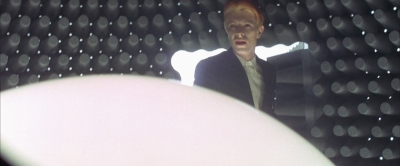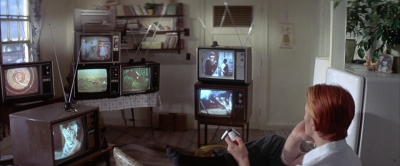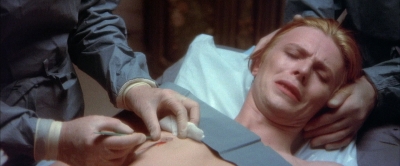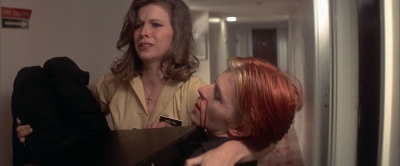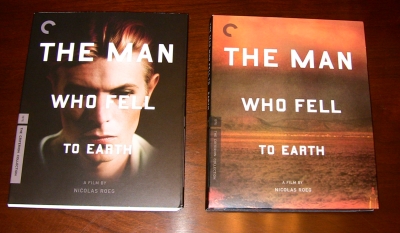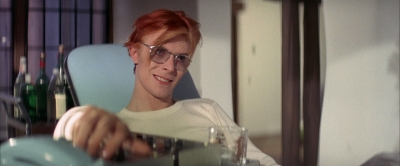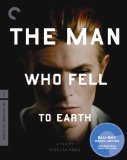| Reviews & Columns |
|
Reviews DVD TV on DVD Blu-ray 4K UHD International DVDs In Theaters Reviews by Studio Video Games Features Collector Series DVDs Easter Egg Database Interviews DVD Talk Radio Feature Articles Columns Anime Talk DVD Savant Horror DVDs The M.O.D. Squad Art House HD Talk Silent DVD
|
DVD Talk Forum |
|
|
| Resources |
|
DVD Price Search Customer Service #'s RCE Info Links |
|
Columns
|
|
|
Man Who Fell to Earth, The
The Criterion Collection // Unrated // December 16, 2008
List Price: $39.95 [Buy now and save at Amazon]
"In Brueghel's Icarus, for instance: how everything turns away
Quite leisurely from the disaster; the ploughman may
Have heard the splash, the forsaken cry,
But for him it was not an important failure; the sun shone
As it had to on the white legs disappearing into the green
Water; and the expensive delicate ship that must have seen
Something amazing, a boy falling out of the sky,
Had somewhere to get to and sailed calmly on."
- W.H. Auden, "Musée des Beaux Arts"
The Man
Who Fell to Earth was cut to tatters and dismissed with an indifferent, half-confused shrug when the film first bowed on these shores more than thirty years ago. This adaptation of the Walter Tevis novel -- a science fiction story without any of the familiar genre trappings -- soon found its audience, though, thanks to masterful direction by Nicolas Roeg (Walkabout; Don't Look Now) and an outstanding performance by David Bowie in his first feature film role. The Man Who Fell to Earth now has the distinction of being among the first four titles selected by the Criterion Collection for their initial wave on Blu-ray, joined by Bottle Rocket, Chungking Express, and The Third Man (which, coincidentally, is excerpted in this film).
The Man Who Fell to Earth opens as a slightly disoriented figure stumbles into a sleepy New Mexico town. With seemingly nothing to his name but a passport, an engraved wedding ring, and the clothes on his back, Thomas Newton (David Bowie) -- as he politely introduces himself -- sells what looks to be the last of his worldly possessions in an antique store for just twenty dollars. When we next see Newton, he's drinking from a pond while fiddling with a rack of similar rings and a fist-sized roll of hundred dollar bills. Money is of paramount importance to Mr. Newton. This initial venture is just meant to collect enough to attract the attention of a respected patent attorney (Buck Henry) who Newton presents with a folder of handwritten figures and formulas -- the basis for nine basic patents that Farnsworth estimates to be worth north of three hundred million dollars within just a few short years. Newton grimaces at that number, noting through a mildly disappointed frown that it's not enough.
It's certainly an unconventional start to a science fiction film, stepping away from lingering glimpses of alien craft, foam rubber prosthetics, and titanic, Kirbyesque machinery. No, there's just a somewhat awkward and thoroughly British figure with a corporate business plan, a drive for amassing an inconceivably massive fortune, and a
voracious thirst for water. Newton keeps his cards close to his chest, offering Farnsworth a sufficiently obscene salary to discourage him from bombarding his new business partner with too many questions. World Enterprises quickly ensnares its tentacles into every avenue of life: publishing, construction, and exotic consumer electronics. Still, it's not enough.
Within a few years, Newton has the entire resources of his empire redirected into a new project, one that baffles Farnsworth for being so impractical. Still, it attracts the interest of Dr. Nathan Bryce (Rip Torn), a divorced scientist in a state of arrested development who's been given purpose for his life after years of mindlessly fooling around with nubile freshman girls.
Although Newton had always kept himself at arm's length from the day-to-day operations of the company, he's even further removed now; one of the wealthiest men on the planet is holed up in a low-rent apartment with a bubbly twentysomething cleaning lady (Candy Clark). Life on Earth has caused Newton to lose sight of a mission he's still reluctant to confide in anyone about, now compelled by his pursuit of more earthly pleasures, particularly the thrall of arrays of televisions and a newfound fascination with alcohol. Newton's pursuit of a massive empire has earned him some enemies deep within the United States government as well, viewing the one paradigm shift after another introduced by World Enterprises to threaten the stability of the nation's economy. As in Auden's poem,
if this brightly burning star violently descends to the earth below, will anyone notice? Would anyone even care?
The Man Who Fell to Earth is an unavoidably divisive film. In his audio commentary, director Nicolas Roeg seems somewhat startled that he was able to helm a movie like this in the first place; its producers and distributors were so distracted by the concept of having a marquee draw like David Bowie on-board that they paid little attention to the script itself. The film doesn't fit comfortably in the confines of any single genre. It doesn't carefully guide viewers along, leaping forward years and sometimes seemingly decades without intertitles or expository visual clues. Its runtime approaches a daunting two and a half hours without being propelled by any real action or even much of an antagonist to struggle against. If the liner notes tucked inside its case are any indication, seemingly everyone on the cast and crew has a different perspective of what The Man Who Fell to Earth is actually about.
That's part of what fascinates me so much about the film. The Man Who Fell to Earth is like an abstract painting: it's striking enough to be appreciated for its surface merits, but it leaves room for an enormous amount of interpretation. This isn't an inaccessible film, at least in my opinion, but it still challenges the audience, revealing a previously undiscovered layer with each viewing. There's a level of social satire about the consumptive nature of American society. A subplot about the government's heavy-handed intervention in finance and business -- confident in the belief that what it's doing is right but taking a destructive, murderous approach just the same -- seems, at least to a point, more relevant than ever in these days of multibillion dollar corporate bailouts. Newton exchanging his initial thirst for something else entirely...watching as a character from one world is immersed into another only to find himself irrevocably transformed in the process, harkening back to Roeg's Walkabout...the Christ-like metaphor about a being descending from the heavens with only the best of intentions that nonetheless is
faced with an inevitable betrayal....the characters inadvertently responsible for Newton's downfall being corrupted by his influence in turn...even a title wielding a double meaning about Newton's descent...The Man Who Fell to Earth isn't a film that can ever hope to be fully explored in this sort of review.
There's so much I appreciate about the artistry of The Man Who Fell to Earth. The traditional stranger-in-a-strange-land story tends to place its emphasis on how uprooted characters directly respond to strange and unfamiliar situations, but this isn't at all the case in this film. The Man Who Fell to Earth is far more fascinated by how these sorts of scenarios can so profoundly transform a person over time. Roeg's talent for intercutting two separate sets of images and expressing a third, distinct message in the process -- most memorably portrayed in the interweaving of impassioned, carnal sex in Don't Look Now with the quiet banality of getting dressed for a night on the town -- is an integral part of this film as well. The Man Who Fell to Earth is even more intensely sexual than Don't Look Now, weaving a theme about the gulf between true intimacy and frenzied but rote lust that comes full circle in its final moments. The dry wit to its dialogue frequently sparkles as well. Two of my favorite exchanges:
craftsmanship as a director is sharp enough to prevent the film from ever feeling disorienting despite the continuous and enormous leaps forward in time, and the evocative imagery, brilliant use of montage, and outstanding performances leave The Man Who Fell to Earth feeling as if it's just a fraction of its 139 minute runtime.
In a film with a number of wonderful performances, the most inspired is the casting of David Bowie as Newton. Despite not having another feature film credit to his name at this point in his career, it's difficult to picture anyone better suited to the role of this androgynous creature from another world than the man behind Ziggy Stardust. Bowie may have been used to playing characters large enough to reach fans in the nosebleed seats in his arena shows, but he plays Newton with a remarkable amount of restraint. The flickers of hesitation upon first meeting Farnsworth, his wonderfully British politeness at every turn, the steeled confidence with which he announces his corporate plans as he strolls out the door -- they're fairly subtle gradations of a character Bowie makes wholly his own from the outset.
The Man Who Fell to Earth is a tremendous film: abstract, evocative, haunting, outstandingly well acted and directed, and, it's worth noting, still extraordinarily entertaining. This is not a conventional title to turn to while marking a company's debut into a new home video format, but it's an inspired choice and gives me even greater hope to see what The Criterion Collection will have to offer over the coming years. Highly Recommended.
Video
Another strong
showing in Criterion's opening salvo in high definition, The Man Who Fell to Earth looks wonderful on Blu-ray. This high resolution remaster -- approved by director Nicolas Roeg -- is immaculate, free of any trace of wear or damage. The slightly grainy texture of the original photography has been flawlessly retained, showing no signs of being smeared away by clumsy digital noise reduction. The bitrate of this AVC encode is high enough that this sort of pervasive grain doesn't cause the compression to stutter anywhere throughout. The cinematography has a tinge of softness that contributes to the dreamlike quality of the film -- particularly when Roeg intercuts glimpses of Anthea as Newton succumbs to the trappings of his life on Earth -- but the scope image is reasonably crisp and detailed just the same.
Admittedly, though, this isn't the traditional sort of dazzling home theater eye candy. Like quite a number of films from this era, the visual style tends to be somewhat soft, gritty, and muted, and the edges of the frame in its anamorphic photography infrequently look somewhat blurry and less distinct. Its colors deliberately don't leap off the screen but are certainly vibrant enough, especially the consistently ruddy tint to Newton's hair. The Man Who Fell to Earth doesn't boast that sort of three-dimensional, almost tactile appearance so frequently associated with the format, but neither that nor these other scattered comments should be considered flaws of any sort with this Blu-ray presentation. This is the way The Man Who Fell to Earth was photographed more than thirty years ago and is, by all indications, precisely how it ought to look. It's a considerable upgrade over previous DVD editions, especially for those who missed out on Criterion's 2005 DVD re-release. The Man Who Fell to Earth boasts a strong sense of clarity, definition, and detail, and I don't have any qualms or concerns about its presentation on Blu-ray in the slightest.
Audio
Shrugging off the six-channel remixes from Anchor Bay's DVD, The Man Who Fell to Earth features an uncompressed PCM stereo soundtrack. Its fidelity and limited dynamic range root the film in the mid-1970s -- viewers shouldn't expect crystalline highs or thunderous low-frequency assaults -- but I'm still pleased with the way the film sounds on Blu-ray. The eclectic score by John Phillips and Stomu Yamashta is warm and reasonably full-bodied. The Man Who Fell to Earth's dialogue has somewhat of a dated quality to it but is consistently clear and discernable throughout, and the soundtrack is never marred by any pops, dropouts, or hiss lurking in the background.
The Man Who Fell to Earth includes a set of English subtitles captioned for the deaf and hard of hearing. I don't see a way to enable them through the menus, but this subtitle stream is accessible with the press of a button on the remote. Extras
The Man Who Fell to Earth doesn't carry over all of the printed extras from Criterion's 2005 DVD set -- Walter Tevis' 1963 novel and an essay by Jack Matthews have been excised -- but the other features from that two-disc collection have all made their way to this Blu-ray set. A large percentage of the stills featured here have been scanned at a high definition resolution, and the bulk of the disc's remaining extras are presented in standard definition and anamorphic widescreen.
Criterion has opted against using the format's trademark translucent blue cases for their Blu-ray titles. These digipacks are approximately the same size, though, just a fraction of an inch wider and taller than a traditional Blu-ray case. Other than its size, there's little to indicate at a glance once opened that these are Blu-ray titles, and that's an intriguing design approach. The lack of any large logos or blue banners does offer Criterion more real estate to devote to their wonderfully creative artwork. An extensive, insightful, and similarly wonderfully designed set of liner notes have also been included. One of The Man Who Fell to Earth's running themes is the seductive thrall of television, and the front and back covers of the notes have been photographed from a TV set, blown up to exaggerate the scanlines. The disc's menus take a similar approach.
As collectors likely already know, Criterion has decided to continue with their current numbering system rather than restarting as the company did when they issued their first DVD. The Man Who Fell to Earth is stamped as number 304. The Final Word
An impressively wide net has been cast for The Criterion Collection's initial wave of Blu-ray titles, and as a longtime admirer of Nicolas Roeg's, it's a thrill to see The Man Who Fell to Earth among their first high definition releases. Provocative, strange, haunting, lyrical, and outstandingly directed and performed, The Man Who Fell to Earth defies classification and demands to be experienced at least once.
Criterion has done a remarkable job bringing this unique and unusually compelling film to Blu-ray. Although the printed extras from their lavish two-disc DVD set are missed, The Man Who Fell to Earth looks and sounds wonderful on Blu-ray, and its extensive set of interviews and photographs make for an even more rewarding experience. Highly Recommended.
Quite leisurely from the disaster; the ploughman may
Have heard the splash, the forsaken cry,
But for him it was not an important failure; the sun shone
As it had to on the white legs disappearing into the green
Water; and the expensive delicate ship that must have seen
Something amazing, a boy falling out of the sky,
Had somewhere to get to and sailed calmly on."
- W.H. Auden, "Musée des Beaux Arts"
The Man
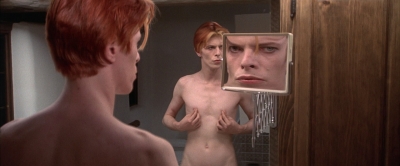 |
| [click on the thumbnail to enlarge] |
The Man Who Fell to Earth opens as a slightly disoriented figure stumbles into a sleepy New Mexico town. With seemingly nothing to his name but a passport, an engraved wedding ring, and the clothes on his back, Thomas Newton (David Bowie) -- as he politely introduces himself -- sells what looks to be the last of his worldly possessions in an antique store for just twenty dollars. When we next see Newton, he's drinking from a pond while fiddling with a rack of similar rings and a fist-sized roll of hundred dollar bills. Money is of paramount importance to Mr. Newton. This initial venture is just meant to collect enough to attract the attention of a respected patent attorney (Buck Henry) who Newton presents with a folder of handwritten figures and formulas -- the basis for nine basic patents that Farnsworth estimates to be worth north of three hundred million dollars within just a few short years. Newton grimaces at that number, noting through a mildly disappointed frown that it's not enough.
It's certainly an unconventional start to a science fiction film, stepping away from lingering glimpses of alien craft, foam rubber prosthetics, and titanic, Kirbyesque machinery. No, there's just a somewhat awkward and thoroughly British figure with a corporate business plan, a drive for amassing an inconceivably massive fortune, and a
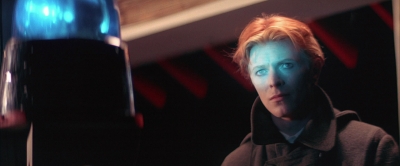 |
| [click on the thumbnail to enlarge] |
Within a few years, Newton has the entire resources of his empire redirected into a new project, one that baffles Farnsworth for being so impractical. Still, it attracts the interest of Dr. Nathan Bryce (Rip Torn), a divorced scientist in a state of arrested development who's been given purpose for his life after years of mindlessly fooling around with nubile freshman girls.
Although Newton had always kept himself at arm's length from the day-to-day operations of the company, he's even further removed now; one of the wealthiest men on the planet is holed up in a low-rent apartment with a bubbly twentysomething cleaning lady (Candy Clark). Life on Earth has caused Newton to lose sight of a mission he's still reluctant to confide in anyone about, now compelled by his pursuit of more earthly pleasures, particularly the thrall of arrays of televisions and a newfound fascination with alcohol. Newton's pursuit of a massive empire has earned him some enemies deep within the United States government as well, viewing the one paradigm shift after another introduced by World Enterprises to threaten the stability of the nation's economy. As in Auden's poem,
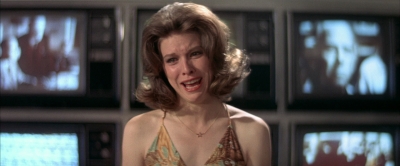 |
| [click on the thumbnail to enlarge] |
The Man Who Fell to Earth is an unavoidably divisive film. In his audio commentary, director Nicolas Roeg seems somewhat startled that he was able to helm a movie like this in the first place; its producers and distributors were so distracted by the concept of having a marquee draw like David Bowie on-board that they paid little attention to the script itself. The film doesn't fit comfortably in the confines of any single genre. It doesn't carefully guide viewers along, leaping forward years and sometimes seemingly decades without intertitles or expository visual clues. Its runtime approaches a daunting two and a half hours without being propelled by any real action or even much of an antagonist to struggle against. If the liner notes tucked inside its case are any indication, seemingly everyone on the cast and crew has a different perspective of what The Man Who Fell to Earth is actually about.
That's part of what fascinates me so much about the film. The Man Who Fell to Earth is like an abstract painting: it's striking enough to be appreciated for its surface merits, but it leaves room for an enormous amount of interpretation. This isn't an inaccessible film, at least in my opinion, but it still challenges the audience, revealing a previously undiscovered layer with each viewing. There's a level of social satire about the consumptive nature of American society. A subplot about the government's heavy-handed intervention in finance and business -- confident in the belief that what it's doing is right but taking a destructive, murderous approach just the same -- seems, at least to a point, more relevant than ever in these days of multibillion dollar corporate bailouts. Newton exchanging his initial thirst for something else entirely...watching as a character from one world is immersed into another only to find himself irrevocably transformed in the process, harkening back to Roeg's Walkabout...the Christ-like metaphor about a being descending from the heavens with only the best of intentions that nonetheless is
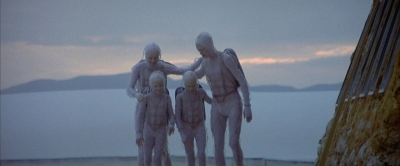 |
| [click on the thumbnail to enlarge] |
There's so much I appreciate about the artistry of The Man Who Fell to Earth. The traditional stranger-in-a-strange-land story tends to place its emphasis on how uprooted characters directly respond to strange and unfamiliar situations, but this isn't at all the case in this film. The Man Who Fell to Earth is far more fascinated by how these sorts of scenarios can so profoundly transform a person over time. Roeg's talent for intercutting two separate sets of images and expressing a third, distinct message in the process -- most memorably portrayed in the interweaving of impassioned, carnal sex in Don't Look Now with the quiet banality of getting dressed for a night on the town -- is an integral part of this film as well. The Man Who Fell to Earth is even more intensely sexual than Don't Look Now, weaving a theme about the gulf between true intimacy and frenzied but rote lust that comes full circle in its final moments. The dry wit to its dialogue frequently sparkles as well. Two of my favorite exchanges:
Roeg's
"My father used to say, 'Oliver, when you get a gift horse, walk up to it, pat it, quiet the animal down, and then, using both hands, force open its jaws and have a damned good look in its mouth.'"
"I'd say that was good advice."
"Yes -- but my father was always wrong...?"
"For two years, I concentrated equally on two things: fucking and World Enterprises. It was neck and neck."
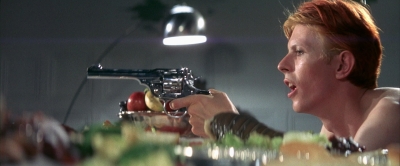 |
| [click on the thumbnail to enlarge] |
In a film with a number of wonderful performances, the most inspired is the casting of David Bowie as Newton. Despite not having another feature film credit to his name at this point in his career, it's difficult to picture anyone better suited to the role of this androgynous creature from another world than the man behind Ziggy Stardust. Bowie may have been used to playing characters large enough to reach fans in the nosebleed seats in his arena shows, but he plays Newton with a remarkable amount of restraint. The flickers of hesitation upon first meeting Farnsworth, his wonderfully British politeness at every turn, the steeled confidence with which he announces his corporate plans as he strolls out the door -- they're fairly subtle gradations of a character Bowie makes wholly his own from the outset.
The Man Who Fell to Earth is a tremendous film: abstract, evocative, haunting, outstandingly well acted and directed, and, it's worth noting, still extraordinarily entertaining. This is not a conventional title to turn to while marking a company's debut into a new home video format, but it's an inspired choice and gives me even greater hope to see what The Criterion Collection will have to offer over the coming years. Highly Recommended.
Video
Another strong
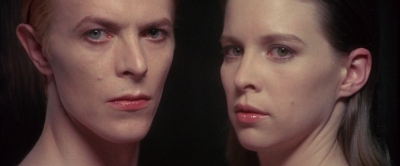 |
| [click on the thumbnail to enlarge] |
Admittedly, though, this isn't the traditional sort of dazzling home theater eye candy. Like quite a number of films from this era, the visual style tends to be somewhat soft, gritty, and muted, and the edges of the frame in its anamorphic photography infrequently look somewhat blurry and less distinct. Its colors deliberately don't leap off the screen but are certainly vibrant enough, especially the consistently ruddy tint to Newton's hair. The Man Who Fell to Earth doesn't boast that sort of three-dimensional, almost tactile appearance so frequently associated with the format, but neither that nor these other scattered comments should be considered flaws of any sort with this Blu-ray presentation. This is the way The Man Who Fell to Earth was photographed more than thirty years ago and is, by all indications, precisely how it ought to look. It's a considerable upgrade over previous DVD editions, especially for those who missed out on Criterion's 2005 DVD re-release. The Man Who Fell to Earth boasts a strong sense of clarity, definition, and detail, and I don't have any qualms or concerns about its presentation on Blu-ray in the slightest.
Audio
Shrugging off the six-channel remixes from Anchor Bay's DVD, The Man Who Fell to Earth features an uncompressed PCM stereo soundtrack. Its fidelity and limited dynamic range root the film in the mid-1970s -- viewers shouldn't expect crystalline highs or thunderous low-frequency assaults -- but I'm still pleased with the way the film sounds on Blu-ray. The eclectic score by John Phillips and Stomu Yamashta is warm and reasonably full-bodied. The Man Who Fell to Earth's dialogue has somewhat of a dated quality to it but is consistently clear and discernable throughout, and the soundtrack is never marred by any pops, dropouts, or hiss lurking in the background.
The Man Who Fell to Earth includes a set of English subtitles captioned for the deaf and hard of hearing. I don't see a way to enable them through the menus, but this subtitle stream is accessible with the press of a button on the remote. Extras
The Man Who Fell to Earth doesn't carry over all of the printed extras from Criterion's 2005 DVD set -- Walter Tevis' 1963 novel and an essay by Jack Matthews have been excised -- but the other features from that two-disc collection have all made their way to this Blu-ray set. A large percentage of the stills featured here have been scanned at a high definition resolution, and the bulk of the disc's remaining extras are presented in standard definition and anamorphic widescreen.
- Audio Commentary: One of the centerpieces of this set's extras is the commentary track from Criterion's 1992 Laserdisc. This audio commentary has been edited together from two separate recording sessions: one with David Bowie and director Nicolas Roeg and another featuring actor Buck Henry. The approach to piecing these two sessions together is different than a more recent track would likely take; rather than nimbly weave together these discussions line-by-line, this commentary tends to focus on one session for several minutes at a time before cutting to another speaker.
This is a tremendous audio commentary, detailing character notes that aren't expressly spelled out on-screen, comments about some of the headaches taking place behind the scenes, and a bit of discussion about the themes and meanings behind certain aspects of the film. Among the highlights are a story from Bowie about how he'd shuttle a library of several hundred books with him wherever he went, Bowie recording sketches of a soundtrack that later transformed into "Low" and "Station to Station", Henry comparing Roeg's work to the likes of Tarkovsky and Godard, Roeg's disinterest in extensive storyboarding and rehearsals, and the butchering The Man Who Fell to Earth suffered when the film first played on these shores. This is a reasonably comprehensive and, especially with Roeg and Bowie, personable discussion, and admirers of the film who take to its abstract nature will be pleased to hear that it doesn't overexplain what The Man Who Fell to Earth is intended to represent.
- Paul Mayersberg (26 min.): The first of several extensive interviews with the talent behind The Man Who Fell to Earth, the film's screenwriter describes in this 2005 conversation the process of translating Walter Tevis' novel to the screen. Along with quite a number of other topics, Mayersberg touches on his emphasis on characterization over the mechanics of the plot, relating elements of this story to Tevis' best known novel, The Hustler, tailoring his screenplay to the talents of this cast, the influence of Japanese culture, and how he approached the film's intense sexuality. The commentary aside, this interview gets the nod as my favorite of the extras on this disc.
- Walter Tevis (25 min.): This audio interview with the novel's author was recorded for radio shortly before his death in 1984. The conversation casts a wide net, frequently touching on his short stories, The Hustler and a sequel that would soon be adapted into a film in its own right, and his interest in "speculative fiction" over ray guns and pulp adventures. The Man Who Fell to Earth does rear its head in this discussion, though, most memorably how Tevis' sense of alienation after being uprooted to Kentucky as a child inspired the novel.
- Performance: Candy Clark and Rip Torn (25 min.): With Bowie and Henry already having contributed their thoughts in the disc's audio commentary, the film's other two stars have Criterion's cameras aimed their way for a set of retrospective interviews. Clark and Torn discuss what attracted them to The Man Who Fell to Earth and these roles in particular, collaborating with David Bowie in his first feature film as well as an acclaimed director like Roeg, and the discomfort of shooting such intense sex scenes as well as nearly nude stretches in elaborate, problematic alien wardrobe.
- Production and Costume Design: Divided into three distinct extras, this section features an interview with production designer Brian Eatwell (23 min.), another interview with his wife, costume designer May Routh (20 min.), and a gallery of eight character and wardrobe sketches. Eatwell's audio interview plays over a series of home movies, stills, and clips from the film, offering notes about the joys of shooting with an entirely British crew in New Mexico, the benefit of having a screenwriter with such a meticulous attention to detail within arm's reach, and the design of the interiors and exteriors of each backdrop. Routh's interview emphasizes the design of each character's wardrobe, and Bowie's is naturally lavished with the bulk of her attention. She also describes the design and construction of the alien watersuits and how much of the wardrobe was bought off the shelves of shops in Albuquerque.
- Trailers (10 min.): A gallery of seven teasers, theatrical trailers, and TV spots document The Man Who Fell to Earth's domestic and international promotion, including one clip that features narration by William Shatner. All are presented in standard definition except for the thirty second TV spot which looks to my eyes to be upscaled.
- Galleries (partially HD): The disc's sprawling collection of stills features somewhere in the vicinity of 275 photographs. Needless to say, they're grouped and subgrouped into a number of individual galleries. One compiles scans from Nicolas Roeg's continuity book: a collage of snips of Polaroids pasted over a dogeared script with notes scribbled throughout the margins. Roeg's work is also highlighted in a gallery of domestic and international posters for Performance, Walkabout, Don't Look Now, Bad Timing, and, of course, The Man Who Fell to Earth. Producer Si Litvinoff also contributes a set of candid snapshots from throughout the shoot, including a visit by luminescent Walkabout star Jenny Agutter and a peek at a t-shirt created for the crew.
The lion's share of these stills are culled from the work of photographer David Jones. All but a handful are in black and white, and these gorgeous images have been rescanned at a dazzlingly high resolution. The galleries are neatly divided by subject, including individual cast members, the brief stretches set on Anthea, and general behind the scenes moments caught on film. Jones also contributes a brief, optional three minute introduction.
Criterion has opted against using the format's trademark translucent blue cases for their Blu-ray titles. These digipacks are approximately the same size, though, just a fraction of an inch wider and taller than a traditional Blu-ray case. Other than its size, there's little to indicate at a glance once opened that these are Blu-ray titles, and that's an intriguing design approach. The lack of any large logos or blue banners does offer Criterion more real estate to devote to their wonderfully creative artwork. An extensive, insightful, and similarly wonderfully designed set of liner notes have also been included. One of The Man Who Fell to Earth's running themes is the seductive thrall of television, and the front and back covers of the notes have been photographed from a TV set, blown up to exaggerate the scanlines. The disc's menus take a similar approach.
As collectors likely already know, Criterion has decided to continue with their current numbering system rather than restarting as the company did when they issued their first DVD. The Man Who Fell to Earth is stamped as number 304. The Final Word
An impressively wide net has been cast for The Criterion Collection's initial wave of Blu-ray titles, and as a longtime admirer of Nicolas Roeg's, it's a thrill to see The Man Who Fell to Earth among their first high definition releases. Provocative, strange, haunting, lyrical, and outstandingly directed and performed, The Man Who Fell to Earth defies classification and demands to be experienced at least once.
Criterion has done a remarkable job bringing this unique and unusually compelling film to Blu-ray. Although the printed extras from their lavish two-disc DVD set are missed, The Man Who Fell to Earth looks and sounds wonderful on Blu-ray, and its extensive set of interviews and photographs make for an even more rewarding experience. Highly Recommended.
|
| Popular Reviews |
| Sponsored Links |
|
|
| Sponsored Links |
|
|
| Release List | Reviews | Shop | Newsletter | Forum | DVD Giveaways | Blu-Ray | Advertise |
|
Copyright 2024 DVDTalk.com All Rights Reserved. Legal Info, Privacy Policy, Terms of Use,
Manage Preferences,
Your Privacy Choices | |||||||









